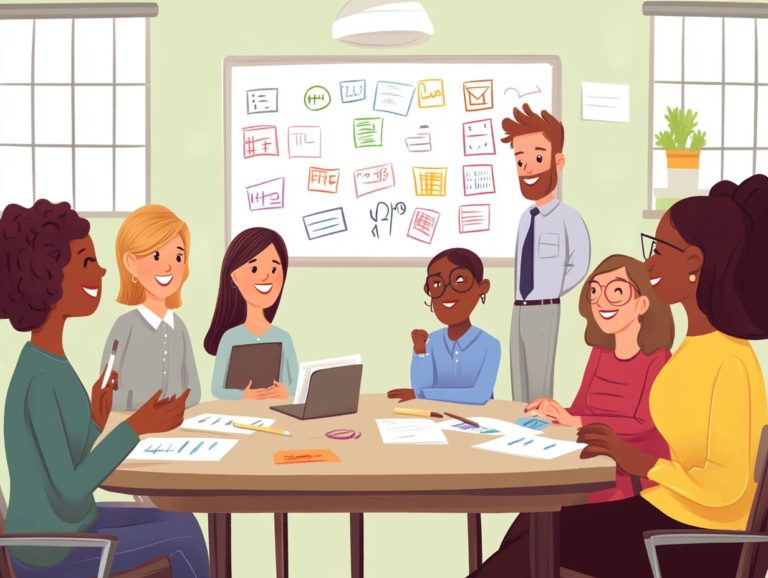Mastering Spanish: Tips for Language Learners
Are you contemplating learning Spanish but feeling uncertain about how to start? This guide is specifically tailored for you.
We’ll help you set realistic goals and find valuable resources. You’ll also master essential grammar, expand your vocabulary, and improve your speaking and listening skills. We ll explore every facet necessary for your success in this linguistic pursuit.
You ll encounter common challenges along the way, along with practical tips to help you maintain fluency. Whether you’re starting from scratch or polishing your existing skills, this article will serve as your roadmap through the vibrant world of Spanish.
Contents
- Key Takeaways:
- Starting Your Spanish Learning Journey
- Mastering Spanish Grammar
- Building Vocabulary in Spanish
- Practicing Speaking and Listening Skills
- Overcoming Common Challenges in Learning Spanish
- Maintaining and Improving Fluency
- Frequently Asked Questions
- What are some tips for mastering Spanish?
- What are some common mistakes to avoid when learning Spanish?
- What are some helpful resources for mastering Spanish?
- How long does it take to become fluent in Spanish?
- Is it necessary to learn Spanish grammar?
- What are some tips for staying motivated while learning Spanish?
Key Takeaways:

Set achievable goals and utilize various resources to kickstart your Spanish learning journey. Master key grammar concepts and actively build your Spanish vocabulary to improve overall language proficiency. Practice speaking and listening skills through immersion and conversation, and embrace challenges to maintain and improve fluency in Spanish.
Why Learn Spanish?
Learning Spanish offers you numerous advantages, from enhancing your communication skills to unlocking a rich cultural tapestry across Spanish-speaking nations like Colombia, Argentina, and Mexico.
As the second most spoken language in the world, Spanish opens doors to personal and professional opportunities, making it an essential skill in our interconnected society.
Whether you aim to travel, connect with native speakers, or immerse yourself in Spanish media, your motivation to learn can significantly elevate your experiences and deepen your understanding of diverse cultures.
Mastering this vibrant language allows you to navigate everyday conversations and appreciate the nuances of art, music, and literature that define Spanish culture.
Proficiency in Spanish can set you apart in the job market, as many employers actively seek candidates who can engage with a diverse client base.
Understanding the language helps you forge deeper connections with communities and enrich your travel experiences.
Engaging with Spanish-speaking cultures helps you develop empathy and widen your perspective, making you a global citizen who can navigate the complexities of our modern world with ease.
Starting Your Spanish Learning Journey
Starting to learn Spanish is both exhilarating and challenging, but with the right approach and resources, you can master the language swiftly.
Whether you re just beginning or refining your existing skills, leveraging effective methods like language learning apps, online courses, and structured strategies lays a solid groundwork for success.
Your commitment to regular practice and well-defined learning goals will be invaluable as you navigate this exciting adventure.
Setting Goals and Finding Resources
Setting clear learning goals and identifying the right Spanish resources are essential steps in your language acquisition journey.
By defining what you aim to achieve whether it s conversational fluency, a solid grasp of grammar, or mastering pronunciation you can customize your approach and find effective methods that align with your personal commitment.
There s a wealth of resources available, from textbooks to online platforms, each catering to different learning styles and objectives.
Establishing specific milestones, like holding a conversation or completing a reading assignment, creates a roadmap that sharpens your focus and enhances your motivation.
Engaging with language learning apps, interactive online courses, and community groups can enrich your experience, offering support and ample opportunities for practice.
Incorporating various resources, such as audiobooks and podcasts, can help you develop your listening skills, while grammar workbooks reinforce your understanding.
Ultimately, your personal commitment to these goals, combined with diverse tools available, can significantly accelerate your learning process, making the journey achievable and genuinely enjoyable.
Mastering Spanish Grammar
Mastering Spanish grammar is an essential step toward achieving fluency. It requires a deep understanding of grammar rules and verb conjugation.
Many learners tend to make common mistakes. By concentrating on key grammar concepts, you will elevate your ability to construct sentences with precision.
This will help you communicate effectively in various contexts, whether in casual conversations or formal writing.
Prioritizing error correction techniques will reinforce your command of Spanish grammar. This allows you to sidestep potential pitfalls and communicate with confidence.
Key Grammar Concepts to Focus On

To communicate effectively in Spanish, you must focus on key grammar concepts. These include common vocabulary, essential phrases, and the rich variety of Spanish accents.
By mastering these elements, you can elevate your speaking abilities and engage in meaningful conversations with native speakers.
A solid grasp of vocabulary allows you to express your thoughts clearly. Using specific phrases makes your interactions more fluid.
Appreciating the nuances of different accents from the melodic cadence of Caribbean Spanish to the crisp enunciation of Castilian can significantly boost your confidence in conversation.
For instance, recognizing how a phrase shifts between regions helps you respond effectively and build deeper connections with speakers. This adaptability enriches your communication and deepens your cultural understanding, turning every conversation into a valuable learning opportunity.
Building Vocabulary in Spanish
Expanding your Spanish vocabulary opens up a world of possibilities! Employing effective learning techniques can greatly enhance your retention and recall.
Whether you’re tackling everyday phrases or diving into specialized terms related to Spanish culture, a strategic approach simplifies acquiring an extensive lexicon.
Tools like a flashcard system can facilitate this journey and enhance your overall learning experience.
Effective Strategies for Learning New Words
Effective strategies for learning new words in Spanish can significantly boost your language retention and fluency.
Techniques such as using language exchange platforms websites or apps where you can practice speaking with native Spanish speakers engaging in conversation practice, and exploring various Spanish resources provide ample opportunities for reinforcement.
Actively interacting with native speakers and immersing yourself in the language solidifies your vocabulary and comprehension.
Incorporating language apps into your daily routine helps you practice consistently. These apps allow you to build your vocabulary at your own pace through interactive games and structured lessons.
Flashcards remain a tried-and-true method; their visual component aids memory retention and makes them especially useful for quick review sessions.
Listening to Spanish podcasts or watching movies immerses you in authentic contexts where you can hear new words in action, deepening your understanding.
By utilizing these diverse methods and platforms, you can create a robust learning environment that expands your vocabulary and transforms your language-learning journey into an enjoyable experience.
Practicing Speaking and Listening Skills
Practicing your speaking and listening skills is crucial for mastering Spanish. There are several approaches you can adopt to elevate your competency and confidence.
Language immersion whether through travel to Spanish-speaking countries or engaging with native speakers in language exchange programs provides invaluable opportunities for real-world application of your skills.
Dedicating time to regular conversational practice will yield remarkable progress in your language journey.
Start immersing yourself in Spanish today to see rapid improvement!
Immersion and Conversation Practice
Immersion and conversation practice are essential for your language learning journey. They provide an authentic cultural context that deepens your understanding of Spanish.
By exploring diverse regions from the vibrant energy of urban centers to the charm of quaint villages you gain a richer appreciation for the many dialects and traditions within the Spanish-speaking world.
Engaging in online language exchanges, where you can chat with native speakers, is crucial. These exchanges allow you to receive real-time feedback and insights into cultural nuances.
Diving into Spanish media, such as films and music, enhances your experience. These forms of entertainment often capture the sentiments and idioms that define everyday communication.
This approach speeds up your learning and connects you deeply with Spanish culture.
Overcoming Common Challenges in Learning Spanish

Overcoming common challenges in learning Spanish is vital for staying motivated and making steady progress.
You may face obstacles like frequent mistakes, frustrating plateaus, and moments of exasperation.
Use targeted learning techniques to tackle these hurdles and keep moving forward. Concentrate on correcting errors and honing effective study habits.
Recognizing that these challenges are simply part of the learning process will help you cultivate resilience and adaptability.
Tips for Dealing with Frustration and Plateaus
Frustration and plateaus in language learning are common. However, effective strategies can reignite your motivation.
Incorporating regular language practice and committing to your goals can be pivotal. Diversifying your learning methods and connecting with supportive communities makes your journey dynamic and enjoyable.
To further tackle these hurdles, set specific, achievable milestones for a sense of accomplishment. Explore new resources like podcasts or interactive apps to inject fresh energy into your routine.
Joining language communities whether online or offline creates camaraderie and accountability, making it easier to share experiences and gain insights from others.
Mixing practice methods, such as blending conversation with grammar exercises, breaks the monotony and reignites your passion for learning. Consistent effort combined with a willingness to adapt leads to progress, turning frustration into growth.
Maintaining and Improving Fluency
Maintaining and enhancing your fluency in Spanish requires ongoing effort and active engagement with the language. Consistent practice is key for long-term retention.
By immersing yourself in Spanish culture through literature, music, and conversation you reinforce your existing skills while broadening your vocabulary.
Writing in Spanish, whether through journaling or crafting short stories, offers a valuable avenue for growth and refinement.
Continuing to Develop Your Spanish Skills
To develop your Spanish skills, tap into various resources. This keeps your language journey fresh and exciting.
Explore the vibrant world of Spanish music and films or dive into language exchange programs, where you can connect with native speakers and practice your skills in real time.
Seek out new methods and experiences regularly. This will maintain your passion for learning and enhance your skills.
Incorporating diverse resources like audiobooks, podcasts, and language apps allows you to practice listening and comprehension in enjoyable ways.
Imagine the joy of cooking traditional Spanish dishes! It s a fun way to sharpen your vocabulary while immersing yourself in culture.
Joining conversation groups or community classes offers invaluable speaking practice and helps you connect with fellow learners.
Watching Spanish films with subtitles is not just entertaining; it also sharpens your pronunciation and contextual understanding.
Embracing different approaches ensures your language-learning experience remains dynamic and fulfilling.
Frequently Asked Questions
What are some tips for mastering Spanish?

1. Immerse yourself in the language: Surround yourself with Spanish through movies, music, books, and conversations with native speakers.
2. Practice consistently: Dedicate time each day to practice and review what you have learned.
3. Use flashcards: Create flashcards with vocabulary and grammar rules to help with memorization.
4. Join a language exchange program: Find a language partner or join a group to practice speaking and get feedback.
5. Watch Spanish TV shows and movies: This will help with both language comprehension and cultural understanding.
6. Don’t be afraid to make mistakes: Embrace mistakes as a natural part of the learning process and learn from them.
What are some common mistakes to avoid when learning Spanish?
1. Translating word-for-word: Spanish grammar and sentence structure are different from English, so trying to translate directly can lead to errors.
2. Ignoring pronunciation: Pay attention to correct pronunciation from the beginning, as it can be difficult to unlearn incorrect habits.
3. Not practicing speaking: Speaking is a crucial aspect of learning a language, so don’t neglect this aspect.
4. Focusing too much on grammar: While grammar is important, don’t get too caught up in memorizing rules. Focus on communication and understanding.
5. Skipping practice and review: Consistency is key in language learning, so make sure to regularly practice and review what you have learned.
6. Not exposing yourself to native speakers: Immersing yourself in the language and having conversations with native speakers is essential for improving your skills.
What are some helpful resources for mastering Spanish?
1. Online courses and apps: There are many online courses and language learning apps that offer structured lessons and practice exercises.
2. Textbooks and workbooks: These can provide a more comprehensive understanding of grammar and vocabulary.
3. Language learning websites: Websites such as Duolingo, FluentU, and Babbel offer a variety of interactive exercises and learning tools.
4. Spanish podcasts: Listening to podcasts in Spanish can improve listening comprehension and expose you to different accents and topics.
5. Tutors or language classes: Consider hiring a tutor or enrolling in a language class for more personalized instruction and feedback.
6. Immersion programs: If possible, consider participating in an immersion program in a Spanish-speaking country to fully immerse yourself in the language and culture.
How long does it take to become fluent in Spanish?
The amount of time it takes to become fluent in Spanish varies for each individual and depends on factors such as your current level, how much time you dedicate to learning, and your learning style. With dedicated practice, you could become fluent in just 1-2 years!
Is it necessary to learn Spanish grammar?
You can communicate in Spanish without perfect grammar, but knowing the rules improves your understanding and effectiveness. Understanding grammar can help you communicate more effectively and accurately and improve your overall mastery of the language.
What are some tips for staying motivated while learning Spanish?
-
Set realistic goals. Small goals help you stay motivated and see your progress.
-
Celebrate your successes. When you hit a milestone or use a new word, enjoy that moment!
-
Find a study buddy or join a group. Practicing with someone keeps you accountable and makes learning fun.
-
Take breaks. Switching up your routine helps prevent burnout.
-
Keep a journal. Writing about your experiences helps you reflect and stay inspired.
-
Always remind yourself why you began this journey! Think of the benefits learning Spanish will bring.






